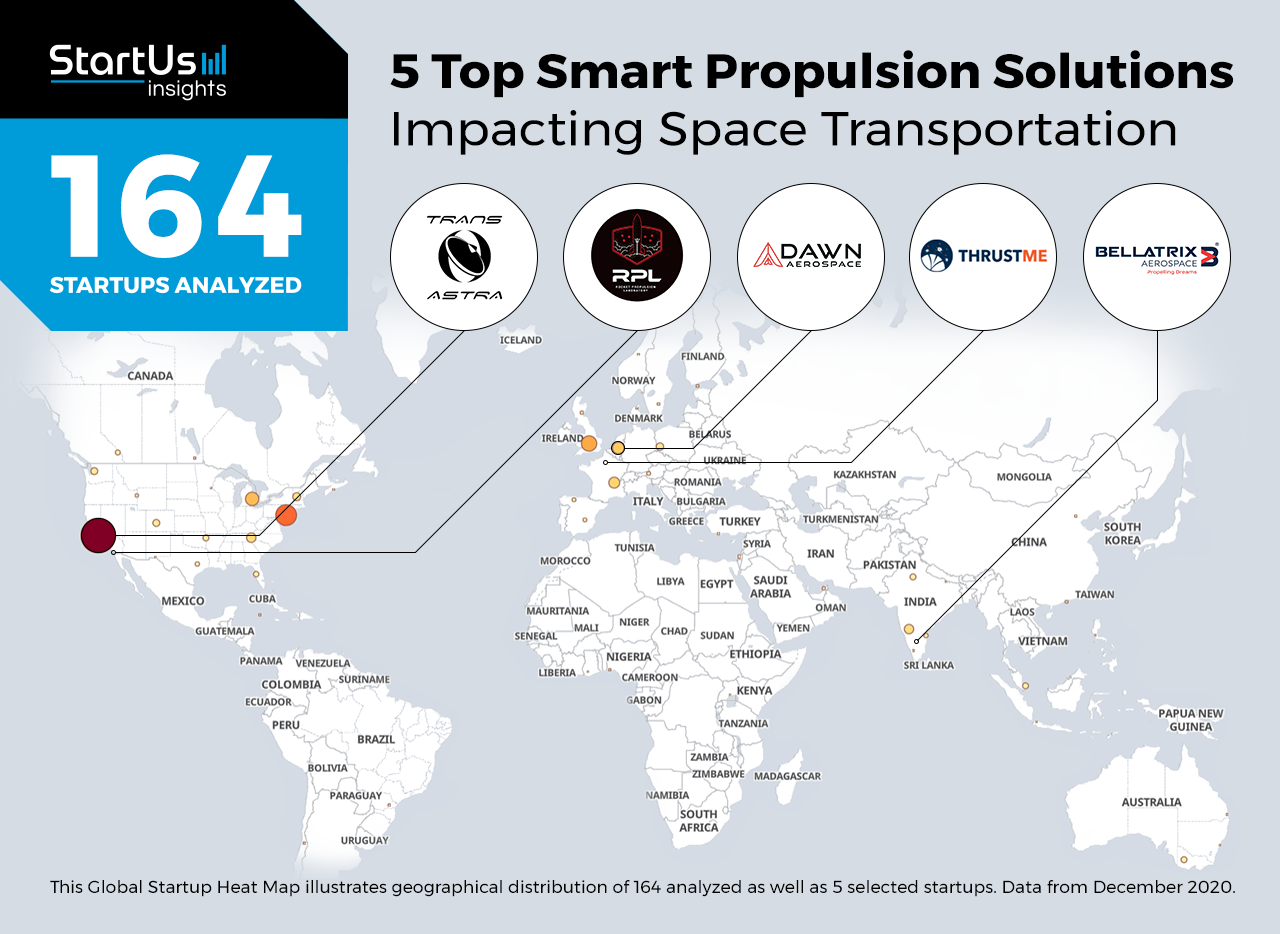Staying ahead of the technology curve means strengthening your competitive advantage. That is why we give you data-driven innovation insights into the space industry. This time, you get to discover 5 hand-picked startups developing smart propulsion solutions.
Global Startup Heat Map: 5 Top Smart Propulsion Solutions
The 5 startups you will explore below are chosen based on our data-driven startup scouting approach, taking into account factors such as location, founding year, and relevance of technology, among others. This analysis is based on the Big Data & Artificial Intelligence (AI)-powered StartUs Insights Discovery Platform, covering over 1.3 million startups & scaleups globally.
The Global Startup Heat Map below highlights the 5 startups & scaleups our Innovation Researchers curated for this report. Moreover, you get insights into regions that observe a high startup activity and the global geographic distribution of the 164 companies we analyzed for this specific topic.
ThrustMe – Iodine-based Propulsion System
In-space propulsion is an important subsystem for satellite constellations. Given the costs and environmental impact that come with space missions, it is very important to ensure the economic and environmental sustainability of these missions. Hence, global startups & scaleups develop several solutions ranging from electric propulsion, green propulsion, and water-based propulsion to iodine-based propulsion systems.
French startup ThrustMe recently demonstrated its electric space propulsion system that uses iodine as a propellant. Iodine’s low price point solves the problem of unnecessary expenditure in creating a propulsion system for bigger satellites. That is why ThrustMe’s technology is applied in next-generation satellites as well as products designed to solve emerging challenges in space associated with the rise of satellite constellations.
Trans Astronautica – Water-based Propulsion System
Innovative propulsion solutions that eliminate the need for highly processed and dangerous propellants are becoming essential for a sustainable future and a cleaner space. Water-based thrusters for small satellites are one of the best solutions leading to a safer and cleaner future because of non-toxic elements like hydrogen and oxygen.
In order to use water, mined from asteroids, as a propellant, the US-based startup Trans Astronautica has created the Omnivore Thruster. The thruster uses a water-based propulsion system that eliminates the need for highly processed and dangerous propellants, making it suitable for in-space cargo transportation and space tourism. The Omnivore Thruster is projected to operate in a vacuum at 360 Isp (exhaust velocity). This high Isp is achievable using the sun’s energy to reach a temperature of 3.000 Kelvin, causing the water to vaporize and leave the chamber at high speed.
Rocket Propulsion Laboratory (RPL) – Methane-based Propulsion System
To reduce air pollution during rocket launches, research has been done to develop space propellants that are environmentally friendly and contribute to a future with non-toxic propellants. The use of methane is one such advancement towards green propulsion.
The Rocket Propulsion Laboratory is a student organization at the University of California, in San Diego, composed of a team of engineering students with a passion for aerospace design. The team designed the rocked LAUNCHY MCLAUNCHFACE, powered by a 3D printed “Remove Before Flight”, RBF-1, which is a liquid oxygen oxidizer and methane rocket engine. Apart from this, RPL also hosts workshops and seminars to teach students these critical engineering skills throughout the year.
Bellatrix Aerospace – Electric Propulsion System
Electric propulsion systems are the prime mover for affordable access to space. This is because electric thrusters typically use much less propellant than chemical rockets as they have a higher exhaust speed compared to chemical rockets.
Indian startup Bellatrix Aerospace specializes in in-space propulsion systems & orbital launch vehicles. Based out of the Indian Institute of Science in Bangalore, the company develops patented Microwave Electro-thermal Thrusters (MET), an advanced type of electric propulsion for satellites. These thrusters are useful for nano and microsatellite propulsion as the power requirement for the thrusters is relatively low in comparison to propulsion systems of large satellites.
Dawn Aerospace – Non-Toxic Propulsion System
Toxic rocket chemicals and throwing single-use rockets in the ocean is becoming a thing of the past as awareness for sustainability and the climate crisis increases. Therefore, startups & scaleups globally are now developing techniques to reuse launch vehicles and develop propellants that are less toxic and do not harm the environment.
Based in New Zealand and the Netherlands, Dawn Aerospace builds same-day reusable launch vehicles and high-performance, non-toxic propulsion systems for satellites of all sizes. For their product SmallSat, the startup simplifies systems and replaces poisonous hydrazine with nitrous oxide and propene. For CubeSats, it increases capabilities by supplying 1.000x higher performance than electric-based propulsion systems with the same propellants.
Discover more SpaceTech startups
To keep you up-to-date on the latest technology and emerging solutions, we provide you with actionable innovation intelligence – quickly and exhaustively. You can download our free Industry Innovation Reports and discover new business opportunities or save your time & let us look into your areas of interest. We provide you with an exhaustive overview of new startups, scaleups & emerging technologies that matter to you.







